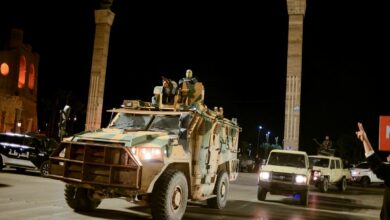President Mohamed Morsy will address the nation on Thursday, calling for unity as he pushes through a new constitution he hopes will defuse a crisis prompted by his decision to grant himself sweeping powers.
The assembly tasked with writing the constitution ended its session in the early hours on Thursday, wrapping the final draft it will put to vote later in the day.
But as Morsy's opponents pressed on with their week-old protests in Cairo's Tahrir Square, critics said the Islamist-dominated assembly's bid to finish the constitution quickly could make matters worse.
Two people have been killed and hundreds injured in countrywide protests set off by Morsy’s decree since it was issued last week.
The Muslim Brotherhood, the Islamist group which was behind Morsy’s election in June, hopes to end the crisis by replacing the decree with an entirely new constitution to be approved in a popular referendum, a Brotherhood official told Reuters.
It is a gamble based on the Islamists' belief that they can mobilize enough voters to win the referendum. They have won all elections held since Hosni Mubarak was toppled from power.
But the move seemed likely to deepen divisions that are being exposed in the street.
In his speech, Morsy was expected to explain why he had issued his decree and to outline what he saw as conspiracies being planned by his non-Islamist political opponents, officials said. He would also call for national unity.
The Muslim Brotherhood and its Islamist allies have called for protests on Saturday in Tahrir Square, setting the stage for more confrontation with their opponents, who staged a mass rally there on Tuesday.
The constitution is one of the main reasons Morsy is at loggerheads with non-Islamist opponents. They are boycotting the 100-member constitutional assembly, saying the Islamists have tried to impose their vision for Egypt's future.
The assembly's legitimacy has been called into question by a series of court cases demanding its dissolution. Its standing has also been hit by the withdrawal of members including church representatives and liberals.
But shortly after the assembly ended its last session, state TV reported that some of the 14 members who had walked out to protest the Islamist dominated makeup of the panel, now returned to it to take part in the vote. It did not state how many.
One of the articles to be voted on prevents leading figures of Mubarak's now banned National Democratic Party from running for office or entering any elections, parliamentary or otherwise, for at least 10 years.
Riot police
Just down the road from the constitutional assembly meeting, protesters were clashing with riot police in Tahrir Square. Members of the assembly watched on television as they waited to go into session on Wednesday.
"The constitution is in its last phases and will be put to a referendum soon and God willing it will solve a lot of the problems in the street," said Talaat Marzouk, an assembly member from the Salafi Nour Party, as he watched the images.
But various activists, whose online blogging helped ignite the anti-Mubarak uprising, have said a constitution passed in such circumstances would only entrench authoritarianism.
The constitution is supposed to be the cornerstone of a new, democratic Egypt following Mubarak's three decades of autocratic rule. The assembly has been at work for six months. Morsy had extended its 12 December deadline by two months — extra time that the assembly speaker said was not needed.
The constitution will determine the powers of the president and Parliament and define the roles of the judiciary and a military establishment that had been at the heart of power for decades until Mubarak was toppled. It will also set out the role of Islamic law, or Sharia.
The effort to conclude the text quickly could mean trouble, said Nathan Brown, a professor of political science at George Washington University in the United States.
"It may be regarded with hostility by a lot of state actors too, including the judiciary," he said.
Leading opposition and former Arab League chief figure Amr Moussa slammed the move. He walked out of the assembly earlier this month. "This is nonsensical and one of the steps that shouldn't be taken, given the background of anger and resentment to the current constitutional assembly," he told Reuters.
Once drafted, the constitution will go to Morsy for approval, and he must then put it to a referendum within 15 days, which could mean the vote would be held by mid-December.
The assembly said that legislative powers assumed by Morsy in August would be handed to the Shura Council, or upper house of Parliament, once the constitution is ratified at the weekend. Morsy is expected to call for a referendum on the constitution early next week.
A constitution must be in place before a new Parliament can be elected, and until that time Morsy holds both executive and legislative powers. An election could take place in early 2013.




